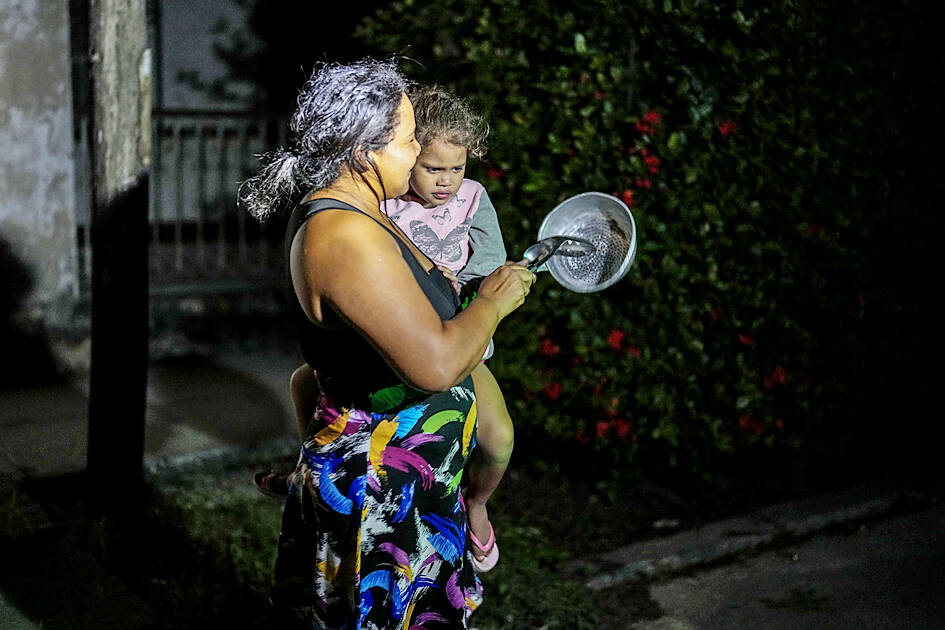AP, HAVANA
Many Cubans on Sunday waited in anguish and some took to the streets in protest as widespread blackouts stretched into their third day. Their concerns were heightened as a Hurricane Oscar hit Cuba’s eastern coast with winds and heavy rain.
In Santo Suarez, part of a populous neighborhood in southwestern Havana, people went into the streets banging pots and pans in protest on Sunday night.
“We haven’t had electricity for three nights and our food is rotting. Four days without electricity is an abuse to the children,” resident Mary Karla, a mother of three, told The Associated Press.

Residents protest a lack of electricity by banging pots and pans in Havana on Sunday.
Photo: AP
She did not give her surname.
The protesters, who say they have no water either, blocked the street with garbage.
Cuban Minister of Energy and Mines Vicente de la O Levy at a news conference said that he hopes the electricity grid would be restored yesterday or this morning, but he said that Oscar, which made landfall on the eastern coast on Sunday evening, would bring “an additional inconvenience” to Cuba’s recovery since it would touch a “region of strong [electricity] generation.”
Key Cuban power plants, such as Felton in the city of Holguin, and Rente in Santiago de Cuba, are located in the area.
Oscar later weakened to a tropical storm, but its effects were forecast to linger through yesterday.
Some neighborhoods had electricity restored in Cuba’s capital, where 2 million people live, but most of Havana remained dark. The impact of the blackout goes beyond lighting, as services such as water supply also depend on electricity to run pumps.
People resorted to cooking with improvised wood stoves on the streets before the food went bad in refrigerators.
In tears, Ylenis de la Caridad Napoles, the mother of a seven-year-old girl, said that she was reaching a point of “desperation.”
The failure of the Antonio Guiteras plant on Friday last week, which caused the collapse of the island’s whole system, was just the latest in a series of problems with energy distribution in a nation where electricity has been restricted and rotated to different regions at different times of the day. The status of Cuba’s other power plants was unclear.
People lined up for hours on Sunday to buy bread in the few bakeries that could reopen.
Some Cubans like Rosa Rodriguez have been without electricity for four days.
“We have millions of problems, and none of them are solved,” Rodriguez said. “We must come to get bread, because the local bakery is closed, and they bring it from somewhere else.”
The blackout was considered to be Cuba’s worst since Hurricane Ian hit the island as a Category 3 storm in 2022 and damaged power installations. It took days for the government to fix them. This year, some homes have spent up to eight hours a day without electricity.
The Cuban government on Sunday said that some electricity had been restored, but the 500 megawatts of energy in the electricity grid, far short of the usual 3 gigawatts it needs, had quickly decreased to 370 megawatts.
Even in a nation that is used to outages as part of a deepening economic crisis, Friday’s collapse was massive.
The Cuban government has announced emergency measures to slash electricity demand, including suspending school and university classes, shutting down some state-owned workplaces and canceling nonessential services.



